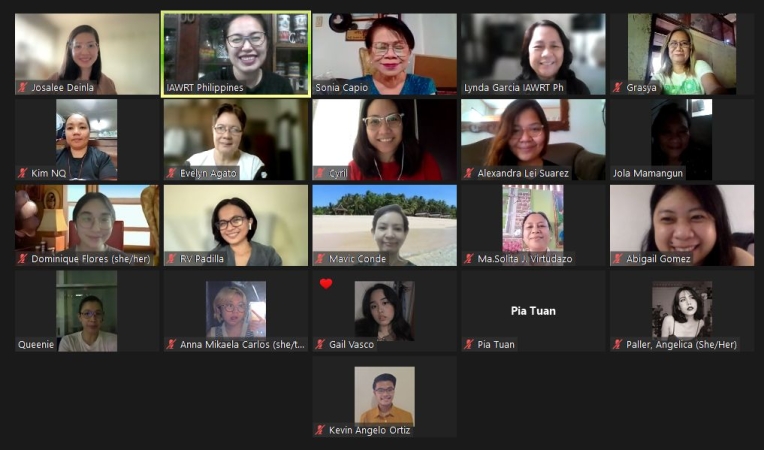IAWRT Philippines holds paralegal training on counter-terrorism and free speech
By Cyril Dayao
March 2, 2023
Last February 26, 2023, the International Association of Women in Radio and Television – Philippines held a paralegal training on how counter-terrorism measures impact free speech and the practice journalism.
“Current counter-terrorism measures in the Philippines have a profound and grave impact on free speech and press freedom,” said the secretary general of the National Union of Peoples’ Lawyers (NUPL) and human rights lawyer Josalee Deinla, who discussed the issue currently faced by society regarding counter-terrorism.
During the training, Deinla noted that there has been a so-called “security pandemic” all over the world since the 9/11 attacks in 2001.
Various entities intrinsic to the global counter-terrorism architecture have emerged. Then UN secretary-general Kofi Annan reminded that counter-terrorism measures must not unduly curtail human rights.
“The proliferation of security measures to counter terrorism and the adoption of measures that restrict civic space are happening simultaneously,” Deinla explained.
As the security space is ramped up, she said that it leads to the narrowing of the civic space.
“Unfortunately, human rights or civic space are being marginalized under this context.”
In recent times, there has been no balance between the civic space and the security space, and no region or country is immune to the “security pandemic.” The Philippines is among those affected by this counter-terrorism architecture.
“What is happening in the Philippines is not different from what is happening in other countries because of the UN Security Council resolution and the recommendations of various international bodies,” Deinla shared.
Human rights concerns
The international counter-terrorism architecture is characterized by a blanket approach to counter-terrorism legislation as there is no universal or single definition of terrorism all over the world.
“That is one of the problems that human rights experts have had for a long time, the lack of an agreed definition of terrorism and even violent extremism,” Deinla said.
States, she added, are free to define the term however they wish to, “so there is a problem with its interpretation in terms of broadness and this could violate the rights of the citizens.”
There is also a polarizing rhetoric, “You’re either with us or not with us,” wherein those who question the legitimacy of counter-terrorism measures are voices being silenced.
Impact of counter-terrorism laws on free speech and press freedom
In recent years, among the most contentious was the passing of an anti-terror law in the Philippines.
“The counter-terrorism measures in the Philippines have led to a curtailment of legitimate exercises of fundamental freedoms,” Deinla said.
There is a broad definition of the term terrorism in Section 4 of the Anti-Terrorism Act or Republic Act 11479.
While the capacity of the Anti-Terrorism Act is not limited to the context of criminal prosecution, the concept of terrorism has been conveniently used to delegitimize independent media and stifle or censor free speech. In June 2022, Bulatlat, Pinoy Weekly and other websites were censored by the National Telecommunications Commission in compliance with a blocking order from national security adviser Hermogenes Esperon Jr.
The same year, the Komisyon ng Wikang Filipino (KWF) ordered the cessation publication of five books that allegedly incite terrorism, including “Kalatas: Mga Kuwentong Bayan at Kuwentong Buhay” by Rommel Rodriguez and “Labas: Mga Palabas sa Labas ng Sentro” by Reuel Aguila.
The ban was lifted after three KWF commissioners withdrew their signatures, voiding the said memorandum.
A popular bookstore, Solidaridad, was also red-tagged for selling books with content that allegedly incites terrorism, and its façade was tagged with spray paint.
“In the Philippine context, restrictions on free speech engendering the government’s concept of terrorism compel journalists, artists, writers, and ordinary citizens to be wary of their vulnerability to prosecution for terrorism-related offenses concerning speech,” Deinla said.
With this, there may be a need to re-examine the Philippines’ context of the chilling effect on speech.
“For freedom of speech and of the press to have any meaning, it must likewise protect expression that challenges the status quo,” Deinla added.
About IAWRT Digital Safe House for Filipino Women Journalists
This is the second part of the paralegal training conducted in line with IAWRT’s Digital Safe House for Filipino Women Journalists (https://www.digitalsafehouseph.net/), a one-stop digital hub for women journalists at-risk and those seeking support in the face of online and offline attacks, abuse and violence. The training was attended by the IAWRT executive board, members, and journalism students.
This year, IAWRT eyes the popularization of Digital Safe House for Filipino Women Journalists by promoting it among members of the media and expanding it to members of the organization’s global network. IAWRT Philippines also aims to build capacity and awareness in raising issues related to the safety of women journalists in the Philippines.








